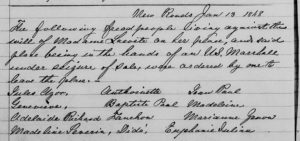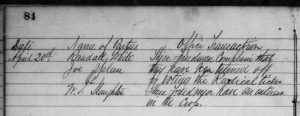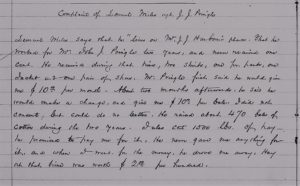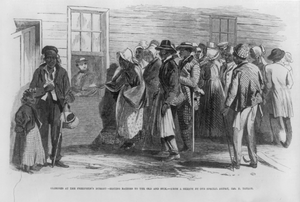“There’s no sense in complaining!”, “Your complaining to the wrong people”, or “Your complaints will fall on deaf ears!”. These are phrases I have sometimes thought, heard, or uttered throughout my life. Well at least a few of my ancestors felt that even in the deep south, during reconstruction, that justice would prevail and they sought justice would by lodging their complaints with the “system”. In my ancestor’s case, the “system” was the Bureau of Refugees, Freedmen and Abandoned Lands.
Popularly known as the Freedmen’s Bureau, the agency was established in 1865 by Congress to help former black slaves and poor whites in the South in the aftermath of the U.S. Civil War (1861-65). Some 4 million slaves gained their freedom as a result of the Union victory in the war, which left many communities in ruins and destroyed the South’s plantation-based economy. The Freedmen’s Bureau provided food, housing and medical aid, established schools and offered legal assistance. It also attempted to settle former slaves on Confederate lands confiscated or abandoned during the war. However, the bureau was prevented from fully carrying out its programs due to a shortage of funds and personnel, along with the politics of race and Reconstruction. In 1872, Congress, in part under pressure from white Southerners, shut the bureau.¹The Bureau of Refugees, Freedmen, and Abandoned Lands (often called the Freedmen’s Bureau) was created in 1865 at the end of the American Civil War to supervise relief efforts including education, health care, food and clothing, refugee camps, legalization of marriages, employment, labor contracts, and securing back pay, bounty payments and pensions.²
The Freedmen’s Bureau records make it possible for us to know some of the challenges our ancestors and others faced during the Civil War and the Reconstruction era. They provide a glimpse into their daily lives and the circumstances in which they found themselves. No doubt this was time when the lives of many across the south had been completely redefined by a singular monumental event called the Civil War which resulted in other monumental events like the emancipation of millions of enslaved, death, injury, relocation, and certainly major disruption to the lives of millions. It was a time of hope, loss, and certainly change! For everyone involved or impacted their existence was now defined in terms of a “new normal” and there was without a doubt, much friction and struggle in defining this new coexistence. A closer look at the these records reveal complaints that these were not just individuals “wining” but in fact, legitimate issues and challenges that needed to be addressed in order for these individuals to move forward with their lives.
Because the Freedmen’s Bureau served ALL people affected by the Civil War , the complaints were made by people who were former slaves, former slave owners, veterans, soldiers, and other citizens. Complaints were lodged for a number of reasons from civil rights, wage disputes, had been violated or mediation of lesser a disputes with a community member.
I discovered this record collection back in 2011 when Bernice Bennett made me aware of Freedmen’s Bureau Labor Contracts and Robin Foster actually provided me with a link to the files that contained the digital images microfilmed Freedmen’s Bureau documents. This repository that is comprised of many files that contain different documents like – reports, letters, contracts, marriage certificates, bank records, lists, and many other types of documents that the Freedmen’s Bureau generated while attempting to bring aid and order during reconstruction.
With the exception of the Freedmen’s Bureau bank records, most of these records were NOT indexed and therefore NOT easily searchable! I would spend hours reviewing document after document, eyeballs dry and burning, until i was catatonic stupor, in search of my ancestors names and any information about where they where enslaved prior to 1870. For me this information that is vital in identifying their origins, any information that would help me provide me crumble that infamous brick wall called slavery.
Thanks to the indexing effort completed last summer by 25,500 volunteer indexers of the Freedmen’s Bureau indexing project , these records are now indexed and easily searchable via databases that are available to the public on Family Searches Website. Instead of entering an ancestor’s name on the search form, I entered two of the locations of my ancestors around the time of the civil war which was Pointe Coupee and East Baton Rouge Parishes both in Louisiana. They both returned a number of records, however the Pointe Coupee search returned a whopping eighteen pages of records. Each record represents the name of a person listed in a complaint. You can also search the complaints by first and or last name.
The Records of Freedmen’s Complaints consists of an Index and images of records related to civil rights complaints. The complaints consisted of problems which freedmen brought to the Bureau’s attention. Many registers give the names of freedmen and the nature of the complaint, but others give only a synopsis of the case without names. The format for recording the complaints seemed to have varied. Some complaints were listed on a single line along with other information such as the date, type of complaint, and persons involved. Other formats included a detailed description of the complaint and perhaps the resolution.

This first complaint was filed by a Plantation owner Madame Lacoste. The complaint was lodged against individuals who were residing on her property after it had been seized by the U.S. Marshals for sale. The individuals on the property may have been former slaves as she owned at least twenty- five prior to emancipation. I am not sure why the feds seized her property. Why was it for sale? Not sure. The individuals listed in this complaint might provide valuable information about the “FFAN” club of any one of these individuals listed. FFAN stands for family, friends, associates, and neighbors. I have an ancestor Marie Rose Paul who would have been in her late teens. I am not sure if the people listed here are related to her.

This complaint was brought by two Freedmen , Joe Splan and Randall White against plantation owner W.S. Slaughter. Joe and Randall are paternal my relatives.“These Freedmen complain that they have been turned off for Voting the Radical Ticket. They have an interest in the crop.” Now I’ll admit that I needed an interpreter for this one. I had no idea what the term “Voting the Radical ticket” meant. The best I could tell is that these Freedmen were turned off the plantation property for wanting to vote the “Radical” or Republican Ticket versus the Democratic ticket. Seems like this was a case of voter intimidation! There was no doubt in my mind that they probably had a significant interest in this crop – a planting, tending, and intent to harvest interest! Of course they intended to reap the profits from their labor. This record served to confirm that this is where some of them may have been prior to emancipation. I noticed a number of complaints about voting in these complaint records.

Samuel Miles was a Freedman who brought complaint against John Julius Pringle, a planter who owned many slaves in Pointe Coupee Parish. Miles, possibly a former slave of Pringle’s, sought fair and agreed upon wages for his labor. This kind of complaint was very common place as I can imagine that many of these plantation owners were also former slave owners and did not like the idea of paying for labor that had previously been free! There were other complaints against Pringle. Several years ago I discovered a Freedmen’s Bureau Labor Contract that showed my ancestor Mary Jane among those that worked for Pringle after slavery.
Here is the direct link to this free invaluable resource. So go ahead, use the link below and type in that ancestor’s surname or location!
United States, Freedmen’s Bureau, Records of Freedmen’s Complaints, 1865-1872
Stay tuned as I intend to share more of my Freedmen’s Bureau “finds”!
For additional Freedmen’s Bureau Resources including a link to the entire Freedmen’s bureau collection, sign up for my blog post notifications and they will be provided as a thank you!
¹http://www.history.com/topics/black-history/freedmens-bureau
²”United States, Freedmen’s Bureau, Records of Freedmen’s Complaints, 1865-1872.” Database with images. FamilySearch. http://FamilySearch.org : accessed 2017. Citing various NARA microfilm publications. Washington, D.C.: National Archives and Records Administration.

Kristin
I have looked and looked but found none of my ancestors in the Freedmen’s Bureau records. Glad you had better luck!
Finding Eliza
Karen Galloway Post author
Kristin I have found that i have to omit the given and/or the surname and sometime just do a general search using the name of the county or town and the state. As i am sure you know, the indexes aren’t perfect and will probably be refined with time. I found the following site to be helpful as it seems to search across all of the FB record sets. http://www.discoverfreedmen.org/